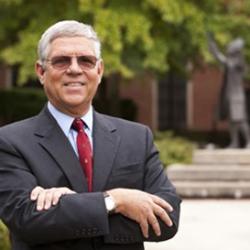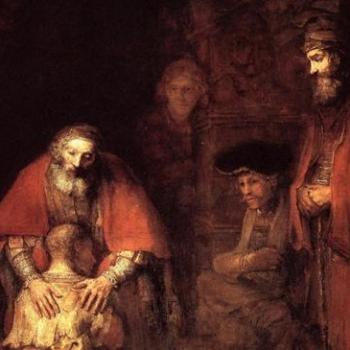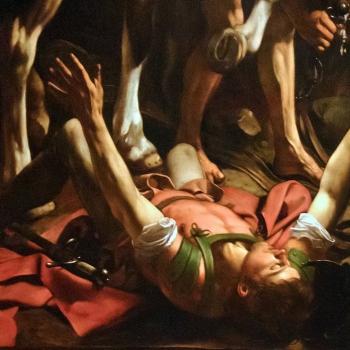When I close my eyes and think about home, certain things come to my mind. Home is that beautiful old Tudor on Jenkinson Court in suburban Chicago. Home is shooting buckets in the driveway behind it or zipping down the bike path toward my friend’s house or popping over to Shirl’s for a chocolate ice cream cone. Home is turning on the radio and hearing Pat Hughes’ voice calling the Cubs game that afternoon. Home can be geography, a place that brings back pleasant memories.
But those pleasant memories bring painful feelings as well. Because we can never go back. My old neighborhood is changed forever by the new middle school they built three doors down from that beautiful old Tudor I grew up in. All the old neighbors are gone, and Shirl’s is boarded up. Yes, home can be geography, but if that’s all it is, then we can truly never go back home.
My wife and I have been talking about home as not a place but as a relationship. Living far from where we grew up and where our families live can cause some level of homesickness, and in those times when we are feeling far from home, we remind each other that home is wherever we and our three daughters are. Home is relationship, as well.
God Intended to Be Our Home
And for all people everywhere and in every time, home is in one particular relationship: with the God who created us to be loved by him. Even deeper than the home that families or friends can create is the home that is formed by our bond with God. In that home was everything we would ever need: love in its purest form and life to its fullest extent.
Unfortunately, we thought we could make it on our own, so we left home to find if there was something more to be had. And so we, the human race, have been in exile ever since, frantically and desperately searching for “home” where there is no home to be found. And Jesus summarizes this exile, this fruitless search for home in his beautiful parable of the lost son.
Last week, we studied the father in this parable and learned of God’s undying love for those who have left home. Today, we will study the younger son, and we will see that all of us, in one way or another, have left home in search for an identity and a life and love on our own. We have listened to voices that have convinced us of our need to prove ourselves worthy of honor and love. We have abandoned our home and left our father.
Yet, there is a way back, and we will see that the younger son was able to find it. And for us, there is a way back home as well. When God is the home, we can always go home.
In this parable, we are told a man has two sons, and the younger one comes to him demanding his inheritance early. Last week, I hinted at how inappropriate this was, but I’ll dive more fully into that so we can understand the depths of this young man’s depravity.
The Younger Son Rejects his Home
Henri Nouwen writes,
The son’s leaving is therefore, a much more offensive act than it seems at first reading. It is a heartless rejection of the home in which the son was born and nurtured and a break with the most precious tradition carefully upheld by the larger community of which he was a part.
Property translates greek word bios which means “life” or “livelihood.” The father’s assets would not have been liquid; they were tied to the land he owned. He would have had to sell ⅓ of his property, or livelihood, passed down to him from generations long gone, in order to give his son what hewanted.
So, the son has told his father he wishes he were dead and the father divides his property in order to give the son what he wished. And what happens next is tragic.
The son leaves home, abandons his father and the only place he has ever known. He chooses to leave the love, security, and provision of his home in order to prove himself. And here is the brilliance of Jesus the storyteller: this younger son, in this way, is all of us.
Our Spiritual Home
We have all left home; all have left the home in which we born and raised. Leaving home for the son was physically abandoning his geographic home. Some of us can relate to this, but some still live on the same land they lived on growing up. But we all leave our spiritual homes. Henri Nouwen defines our spiritual home this way:
Home is the center of my being where I can hear the voice that says: ‘You are my beloved, on you my favor rests.’
When we can no longer hear that voice, it means that we have moved further away from it, surrounding ourselves with other voices telling us other things, crowding out the voice of God. Nouwen, again:
Leaving home is much more than an historical event bound to time and place. It is a denial of the spiritual reality that I belong to God with every part of my being, that God holds me safe in an eternal embrace, that I am indeed carved in the palms of God’s hands and hidden in their shadows.
We Are All Exiles
When we leave home, we abandon the basis of our identity. We become adrift in the world, seeking to prove ourselves worthy of love and affection and praise and honor in this world. All of those things we already had when we were at home we now feel compelled to find on our own. Tim Keller writes,
The Bible says we have been wandering as spiritual exiles ever since [the Fall of man]. That is, we have been living in a world that no longer fits our deepest longings.
We long for long life but our bodies fail us. We long for everlasting love but relationships fall apart, and we long to make a difference in this world through work but experience frustration at every turn. Keller concludes,
The message of the Bible is that the human race is a band of exiles trying to come home. The parable of the prodigal son is about every one of us.
We have all left home. All of us have all sought to do things our own away outside of the influence of our Father. We have all sought to earn the things we already had from birth. We are all spiritual exiles trying to figure out how to get home.
Searching For Home Where It Doesn’t Exist
The younger son, of course, fails in his pursuit of happiness and meaning and significance outside of his home. In the far country he squanders his wealth on frivolity. The subtext of the passage is that he spent his money on prostitutes, about as disgraceful and sinful a way of losing all his money that a first century Jewish person could imagine. Finally, he ends up feeding pigs–an unclean animal Jews were forbidden from touching or eating–and longing to eat the food he was giving them. He had hit rock bottom–spiritually, relationally, economically, physically.
And this is how it goes for us when we try to gain through our own efforts what can only be given to us by God: abject failure. No matter how much money we earn, no matter how many friends we accumulate, no matter how great our families are, we will never have enough, we will never feel good enough, we will never feel like we have found home–unless we return to our Father. And even though it may not feel like it, without God, each and every one of us is feeding pigs longing to eat their food.
The Younger Son Comes to His Senses…Kinda
The young man finally comes to his senses. He recognizes that he is lost and that he is far from home and has failed to make himself worthy. So, he hatches a plan: he will return home and beg his father to make him a hired hand.
The young man realized that he had dishonored and disgraced his father and his whole community. An apology would not be enough; he would have to make restitution as well. He would have to pay his father back the inheritance he had squandered. His plan is to work for his father on his fields while living in the village until he has paid his father back.
He has recognized his error and recognizes his debt. And though he longs to go home, he still plans on returning home on his own terms: paying off a debt that he could not possibly pay back.
What a tremendous insight into humanity we have here. Even when we realize we have to go home, we try to buy our way back. We try to pay back our debts and do enough to compensate for the pain and suffering we have caused others. We try to earn our way back into God’s favor. But we forget that when someone abandons his home, he can’t just go back. He has to be TAKEN back.
God Takes Us Back
So, he goes home. And before he can beg his father to take him back, the father has seen him, embraced him, kissed him, and has his best robe and ring brought out for him. He tells his son he will not wait for him to pay him back, he will not wait until he has groveled enough, he will take him back into his home, as his son, now.

This is the only way to come home. Nothing the son can do will ever make up for what he did to his father. And nothing we can ever do will make up to God for the horrible things we have done to him. The only way we go back home is for God to bring us home. And the point of this part of the story is that God will take us home.
All that is left for us to do is receive God’s forgiveness. This flies in the face of our instincts. As Nouwen writes,
One of the greatest challenges of the spiritual life is to receive God’s forgiveness. There is something in us humans that keeps us clinging to our sins and prevents us from letting God erase our past and offer us a completely new beginning. Sometimes it even seems as though I want to prove to God that my darkness is too great to overcome. While God wants to restore me to full dignity of sonship, I keep insisting that I will settle for being a hired servant.
Forgiveness Seems Too Good to Be True
God’s forgiveness of us and his unconditional love for us seem too good to be true. Everything else we have in life, or so we think, we have earned. We have worked for. People pay us for the work we do. People love us for our kindness or our humor or our success or our generosity. Very rarely in life do we find unconditional love.
When we go home to God after having left him, we try to become the hired hand and earn our way back to him. It’s hard to accept his forgiveness because we know it is not fair. To him.
Forgiveness says, “I see and recognize fully how you wronged me, but I will not demand justice.” For God to forgive our debts, the great heaping pile of debts we owe him, he is relinquishing his right to justice. Yet, this is the only way back home, and the father who created that home for us is willing to pay the price to bring us back to him. We cannot repay the debt by working as his hired hand; we can only accept the gift of his renewed embrace.
A Society of Younger Brothers
We are quickly becoming a society of younger brothers, of people who have left their spiritual homes. In 2007, 16% of Americans identified as either atheistic or agnostic in belief; in 2021, these spiritual ‘nones’ rose to 29% of the adult population of the United States.
According to most research, many of these “nones” may be coming from the church. 50% of churched youth will abandon their faith commitment in the early years post-high school. Youth pastors for years have been wondering which 1 out of every 2 of their students will leave the faith after high school and wondering how they can help prevent that.
For many of people, this issue is much more personal than academic. You could be the parents of children who have left the faith or you may be someone who left and came back. For some people, this issue might be the cause of desperate prayer more than indifferent speculation and theory.
There Is Always Hope for a Homecoming
But the fact that we should all identify, at least a little bit, with the younger son in this parable should give us hope–after all, we are here today! If God can call us home, if we can receive the forgiveness of God, then certainly it is possible for the 29% of our population that have left all faith and certainly it is possible for the son or daughter we love so much to return, too.
And knowing that we, too, are the younger son, we should not be drawn toward an attitude of superiority toward those who do not have a relationship with Christ; rather, we should display empathy and understanding for them, and, as the father in the story, compassion and pity for them. They are what we once were: adrift and searching desperately for a home, searching desperately for love and meaning and significance and purpose in all the wrong places. And we have found what they desperately need: the way back to their true home.
Having a Heart for the Younger Son
The heart the father has for his younger son, the heart that God has for the wayward sinner, that can be our heart, too. Since we know what it is like to live both with and apart from God, we should know the pain and trouble that today’s younger sons are going through. We should respond to them with love and grace. They need a friend to help them back home.
One of my favorite TV shows ever is The West Wing, about the President of the United States and his staff. On one memorable episode, one of the White House staffers, Josh, is struggling with post traumatic stress following a shooting. After meeting with a psychologist, he is greeted by his boss and mentor, Leo, the president’s chief of staff. Josh is worried about his job and about his future but Leo, a recovering alcoholic, tells him this story:
“This guy’s walking down the street when he falls in a hole. The walls are so steep he can’t get out.
“A doctor passes by and the guy shouts up, ‘Hey you. Can you help me out?’ The doctor writes a prescription, throws it down in the hole and moves on.
“Then a priest comes along and the guy shouts up, ‘Father, I’m down in this hole can you help me out?’ The priest writes out a prayer, throws it down in the hole and moves on.
“Then a friend walks by, ‘Hey, Joe, it’s me can you help me out?’ And the friend jumps in the hole. Our guy says, ‘Are you stupid? Now we’re both down here.’ The friend says, ‘Yeah, but I’ve been down here before and I know the way out.'”
The younger brothers of our world need friend to guide them back home to the Father. Ideally, they need their older brothers and sisters to come and find them and bring them home. Will we be that friend to drop into the hole and help them find their way out, find their way back to their home? Or, will we be like the third character in this story? We’ll talk about him next time.
From a sermon preached August 27, 2023.
Thanks for reading! You can join me on Threads, Twitter (or whatever Elon’s calling it these days) and Instagram @revsteve83.


















